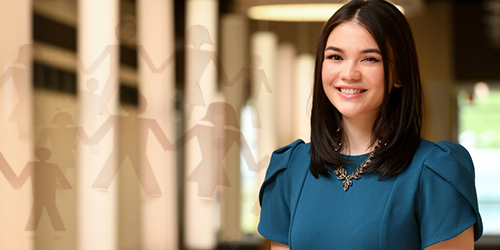Mathematics plus sociology: Hailey D’Elia wants to change the statistics
Mathematics plus sociology: Hailey D’Elia wants to change the statistics

Hailey D’Elia doesn’t need to share the circumstances that placed her into New Jersey’s foster care system at age 16, or all the trauma she endured afterward.
It’s sufficient to say that, after graduating from Rowan University with dual bachelor’s degrees in mathematics and sociology, the Laurel Springs resident plans to pour her energy, knowledge and talent into reforming the nation’s broken child welfare system.
D’Elia rattles through the statistics she’s defied: Just three percent of children who age out of foster care earn a college degree by age 26. About 70 percent of girls in foster care become pregnant by age 21. Half of foster youth graduate from high school.
“The system systematically fails these children and it never actually addresses the issues at hand,” D’Elia says.
After participating in Rowan University’s cap-and-gown ceremony in May, the 22-year-old will intern for the Congressional Coalition on Adoption Institute in Washington, D.C., one of 12 foster care alumni selected from across the country to serve congressional internships and contribute to a published federal child welfare policy report.
It’s empowering work for a former foster child who, at age 19, found a stable home with friends after unfortunate circumstances left her without a home mid-semester. A part-time job with the Learning Resource Center–South helped her afford the necessities. No longer certain about pursuing a career as a math teacher, D’Elia switched to mathematics and sociology, adding an undergraduate certificate in social justice and social change for good measure.
It was just the direction she needed.
Today, she serves as a youth ambassador and youth council member for the N.J. Department of Children and Families. She volunteers for Camp To Belong River Valley, a camp for children separated from their siblings due to the child welfare system.
She participated in National Foster Youth Institute Congressional Shadow Day as a New Jersey state delegate. She also interned for the Congressional Coalition on Adoption Institute Foster Youth Internship COVID-19 Pandemic Working Group, where she co-authored a congressional report on the impact of COVID-19 on the U.S. foster care system. That’s all on top of her student activities.
“My advocacy stems out of my experience in the foster care system and aging out of the foster care system,” says D’Elia, who turned 21 just before the pandemic hit last spring. “It’s definitely been an experience.”
“In the state of New Jersey, we’re actually lucky because we age out at 21,” D’Elia explains. “In other states, some youth age out at 18, and so, of course, that leads to a bunch of terrible statistics … they have higher rates of substance abuse, incarceration, anything along those lines, you name it.”
Children face an immense amount of trauma typically before they enter care or as a result of entering care, D’Elia says. One in four children in foster care experience PTSD. That trauma might also include abuse or neglect—and it affects thousands of kids. About 20,000 foster youth age out of the system nationally every year.
Judi Kibelstis, an instructional material specialist in the LRC–South, has worked closely with D’Elia since 2018. She calls D’Elia “resilient, resourceful and remarkable.”
“She’s so good at trying to find the answer to whatever problems she’s facing. She’s not afraid to dig down and do research,” Kibelstis says. “She's the kind of person who's not only trying to hold the door open for the people behind her, but trying to knock it off the hinges.”
During her sophomore year, D’Elia was elected president of Rowan’s Math Team—an unusually early move for an undergraduate student, says her math adviser, Benjamin Daniels, who is also the team’s faculty adviser. The team recruits students for math competitions and volunteer tutoring, as well as hosts a local math competition.
“The team really benefited from her passion,” says Daniels, a lecturer in the Mathematics Department in the College of Science & Mathematics.
In class, she did “fantastic work” and was an overall delightful student, says Daniels, who often shared his lunch hour with D’Elia. He’s looking forward to seeing how she applies her math skills to her policy research, especially as it relates to interpreting surveys and data collection.
“Interpretation of the model is the most important thing in applied research and mathematics,” Daniels notes. “Being able to bridge the gap between reality and just the abstraction of the numbers is really important.”
She turned down multiple opportunities for graduate school, after finding the costs too daunting. Instead, she plans to relocate near Washington, D.C., ready to tackle child welfare policy.
By combining her talent for research and numbers with the bone-deep knowledge of her lived experience, D’Elia hopes to influence policy and decision-making. She recognizes how difficult that task will be.
“I don’t have a full-blown answer on how to solve these issues—I just know they are there,” D’Elia says. “When you talk to people who have actually experienced it … I think we’ll have a much better understanding of the systems and the issues.”
“She is going to do incredible things,” Kibelstis adds. “And she’s doing incredible things that are going to impact so many people in a positive way. I can’t wait to see everything that she accomplishes.”